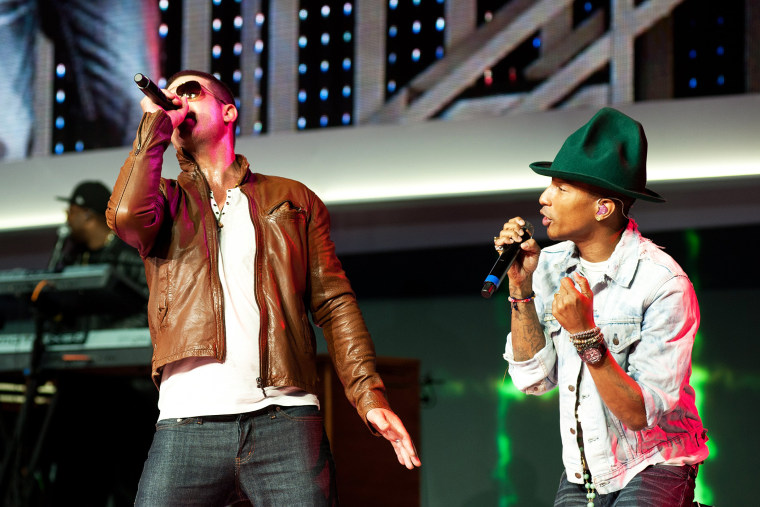Most corporate shareholder meetings don't take place in an arena, with a live audience of 14,000 people. But then again, Wal-Mart isn't like most corporations. On Friday, the world's largest retailer kicked off its annual shareholders gathering in Fayetteville, Ark. with the sort of grandeur and spectacle which its stockholders have come to expect.
First, audience members were treated to a video of Wal-Mart store employees performing the Pharrell Williams song "Happy." Then, following a ceremonial flag dance intended to represent the company's global reach, Williams himself took the stage and did a reprise of the ubiquitous radio hit.
"Put your hands together for Wal-Mart, guys," he said on his way off the stage, "for making the world a happier place."
That sendoff encapsulated the tone for the following three hours of power point presentations, speeches and musical numbers: Despite the company's sagging U.S. sales numbers and simmering labor unrest, Wal-Mart's 2014 shareholders meeting was rarely anything less than relentlessly upbeat. Celebrities like Harry Connick Jr., Robin Thicke, Sarah McLachlan, Aloe Blacc and the aforementioned Pharrell Williams entertained the crowd in between presentations on the company's plans for the future. Company executive went out of their way to stress recent innovations to the Wal-Mart business model and praised the thousands of employees in attendance for their hard work. The only signs that not all was right with the world came when shareholders had an opportunity to present resolutions for a vote.
Charmaine Givens-Thomas, who has worked at a Wal-Mart in Illinois for the past eight years, offered a proposal to the shareholders on behalf of the International Brotherhood of Teamsters General Fund, a union-owned entity which has stock in Wal-Mart. The proposal amounted to a plea for Wal-Mart shareholders to oust the chairman of the company's board, Rob Walton, on behalf of protesting Wal-Mart employees.
"Right now many of us struggle to cover our rent or feed our families because we do not get enough hours or enough pay," said Givens-Thomas. After eight years at the company, she said she currently earns $23,000 a year.
The shareholder protest was the quiet denouement to several days of strikes and rallies taking place around the country. The week before, self-described "Wal-Mart moms" at stores in over 20 cities went on strike in protest of what they describe as poverty wages and abysmal working conditions. Those protests came to a head the day before the shareholders meeting, when workers protested in front of Wal-Mart's headquarters in Bentonville, Ark. That same day, another group of protesters gathered outside of Rob Walton's house.
The strikes and protests were arranged by the union-backed group OUR Walmart, which has spent over a year and half organizing labor uprisings at Wal-Mart locations around the country. The group first gained widespread public attention in November 2012, when it laid the groundwork for a nationwide strike against Wal-Mart on the day after Thanksgiving, the biggest shopping day of the year. The group has never made quite as much of a splash as it did then, OUR Walmart-affiliated workers have consistently turned out to protest the company's labor practices.
Wal-Mart allowed Givens-Thomas a platform to voice her grievances, and then moved on to the next proposal without comment. The proposal was later voted down. Yet OUR Walmart workers managed to speak to Wal-Mart's recently appointed president and CEO Doug McMillon, according to several people associated with the group.
"After we took action this week, I am glad that we had the opportunity to briefly share our concerns directly with Mr. McMillon," said OUR Walmart member Bene't Holmes in a statement from the group. "While we hope this is the beginning a new direction for Wal-Mart, workers need to have a full and substantive conversation with him and know that when they raise concerns they won't face retaliation. I told him about how I was refused light duty work, and then miscarried, and was again denied a leave of absence to recover. Mr. McMillon listened when I told him what it's like to have to rely on food stamps and putting half of my $700 monthly take home to day care."
Wal-Mart spokesperson David Tovar confirmed to msnbc that McMillon had met with “20 or so” OUR Walmart-affiliated workers after the main event. According to Tovar, McMillion “listened really intently” to the workers’ concerns and “shared some stories about when he worked in stores and what he expects in terms of how we should be treating our associates.”
“Doug said we should work together to make the company an even better company than it is today and try to provide more opportunities for associates,” said Tovar.
Wal-Mart has tended to depict OUR Walmart protests as union-backed AstroTurf efforts, featuring only a tiny minority of the company's workforce. For example, a Wednesday email from Tovar to reporters dismissed recent strikes and protests as the act of "PAID STRIKERS" (emphasis in the original) and protesters not affiliated with the company who had been "shipped in to simply disrupt."
"I continue to be amazed at the stark contrast between the positive energy and excitement that I see from the vast majority of our associates and what I read in union press releases," wrote Tovar. "Things that make you go hmmm."
A spokesperson for Robin Thicke declined to comment on the labor protests. Publicists representing the other celebrities in attendance did not reply to requests for comment. Bringing in celebrity guest hosts is an annual tradition for the company, which typically does not pay performance fees for those appearances.
